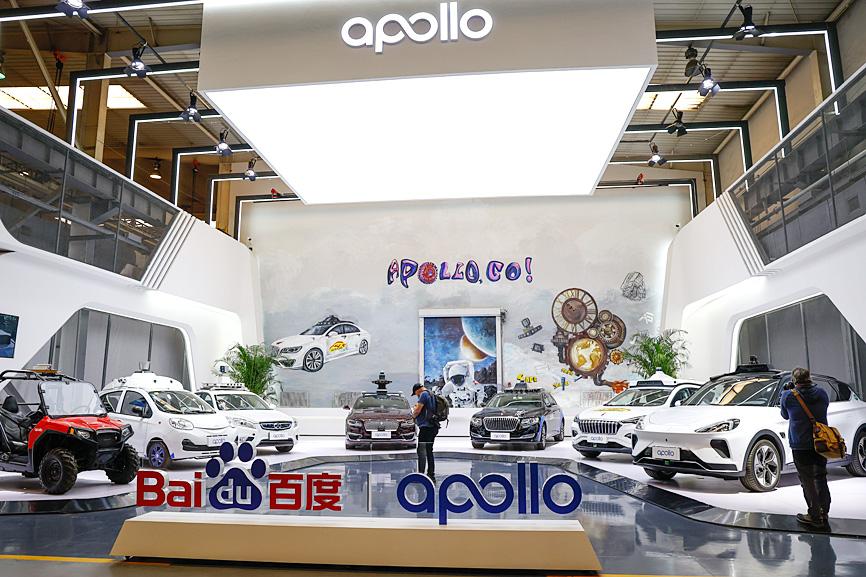China has granted Chinese Internet services company Baidu Inc (百度) and a rival autonomous car company, Pony.ai Inc (小馬智行), permits to provide driverless ride-hailing services to the public in Beijing, a significant regulatory step in the nation’s pursuit of driverless technology.
The permits allow Baidu and Pony.ai to offer rides without a safety driver behind the wheel to take over in cases of an emergency. The new permits still require a safety supervisor to be seated in the front passenger seat.
Baidu said that 10 such autonomous cars yesterday started offering rides to passengers within a 60km2 area in suburban Beijing.

Photo: EPA-EFE
Baidu already operates an autonomous fleet of taxis in Beijing under its Apollo Go ride-hailing services, but they must have a safety driver behind the wheel.
China has ambitions to lead autonomous driving technology globally, but lags the US in introducing such services. Alphabet Inc’s Waymo began offering driverless taxi services in Phoenix, Arizona, in 2020.
In 2020, Beijing set a goal for 70 percent of vehicles sold in 2030 to have Level 2 and Level 3 self-driving technology.
Level 2 is partial driving automation, which means the vehicle can control steering and speed.
Level 3 automation means that the vehicle can detect what is going on around it and drive itself.
Baidu — best known for its search engine and online advertising services — has in the past few years invested heavily in autonomous driving and artificial intelligence (AI) technology, including automated personal assistants and AI chips.
The company said in a statement that it has accumulated more than 27 million kilometers of road testing over the past nine years with no traffic accidents.
Baidu’s Apollo Go autonomous taxi services operate in nine cities across China, including Shanghai, Shenzhen and Guangzhou.

MULTIFACETED: A task force has analyzed possible scenarios and created responses to assist domestic industries in dealing with US tariffs, the economics minister said The Executive Yuan is tomorrow to announce countermeasures to US President Donald Trump’s planned reciprocal tariffs, although the details of the plan would not be made public until Monday next week, Minister of Economic Affairs J.W. Kuo (郭智輝) said yesterday. The Cabinet established an economic and trade task force in November last year to deal with US trade and tariff related issues, Kuo told reporters outside the legislature in Taipei. The task force has been analyzing and evaluating all kinds of scenarios to identify suitable responses and determine how best to assist domestic industries in managing the effects of Trump’s tariffs, he

TIGHT-LIPPED: UMC said it had no merger plans at the moment, after Nikkei Asia reported that the firm and GlobalFoundries were considering restarting merger talks United Microelectronics Corp (UMC, 聯電), the world’s No. 4 contract chipmaker, yesterday launched a new US$5 billion 12-inch chip factory in Singapore as part of its latest effort to diversify its manufacturing footprint amid growing geopolitical risks. The new factory, adjacent to UMC’s existing Singapore fab in the Pasir Res Wafer Fab Park, is scheduled to enter volume production next year, utilizing mature 22-nanometer and 28-nanometer process technologies, UMC said in a statement. The company plans to invest US$5 billion during the first phase of the new fab, which would have an installed capacity of 30,000 12-inch wafers per month, it said. The

Taiwan’s official purchasing managers’ index (PMI) last month rose 0.2 percentage points to 54.2, in a second consecutive month of expansion, thanks to front-loading demand intended to avoid potential US tariff hikes, the Chung-Hua Institution for Economic Research (CIER, 中華經濟研究院) said yesterday. While short-term demand appeared robust, uncertainties rose due to US President Donald Trump’s unpredictable trade policy, CIER president Lien Hsien-ming (連賢明) told a news conference in Taipei. Taiwan’s economy this year would be characterized by high-level fluctuations and the volatility would be wilder than most expect, Lien said Demand for electronics, particularly semiconductors, continues to benefit from US technology giants’ effort

‘SWASTICAR’: Tesla CEO Elon Musk’s close association with Donald Trump has prompted opponents to brand him a ‘Nazi’ and resulted in a dramatic drop in sales Demonstrators descended on Tesla Inc dealerships across the US, and in Europe and Canada on Saturday to protest company chief Elon Musk, who has amassed extraordinary power as a top adviser to US President Donald Trump. Waving signs with messages such as “Musk is stealing our money” and “Reclaim our country,” the protests largely took place peacefully following fiery episodes of vandalism on Tesla vehicles, dealerships and other facilities in recent weeks that US officials have denounced as terrorism. Hundreds rallied on Saturday outside the Tesla dealership in Manhattan. Some blasted Musk, the world’s richest man, while others demanded the shuttering of his